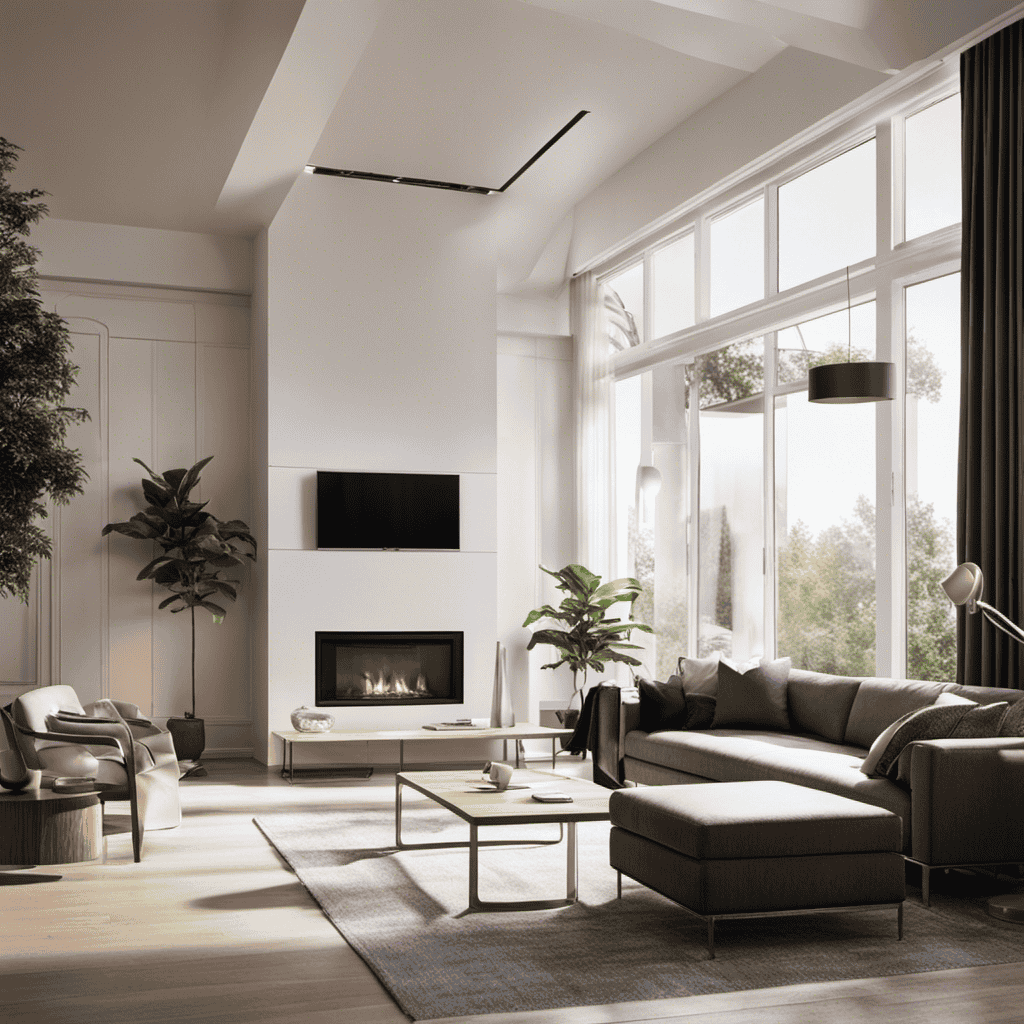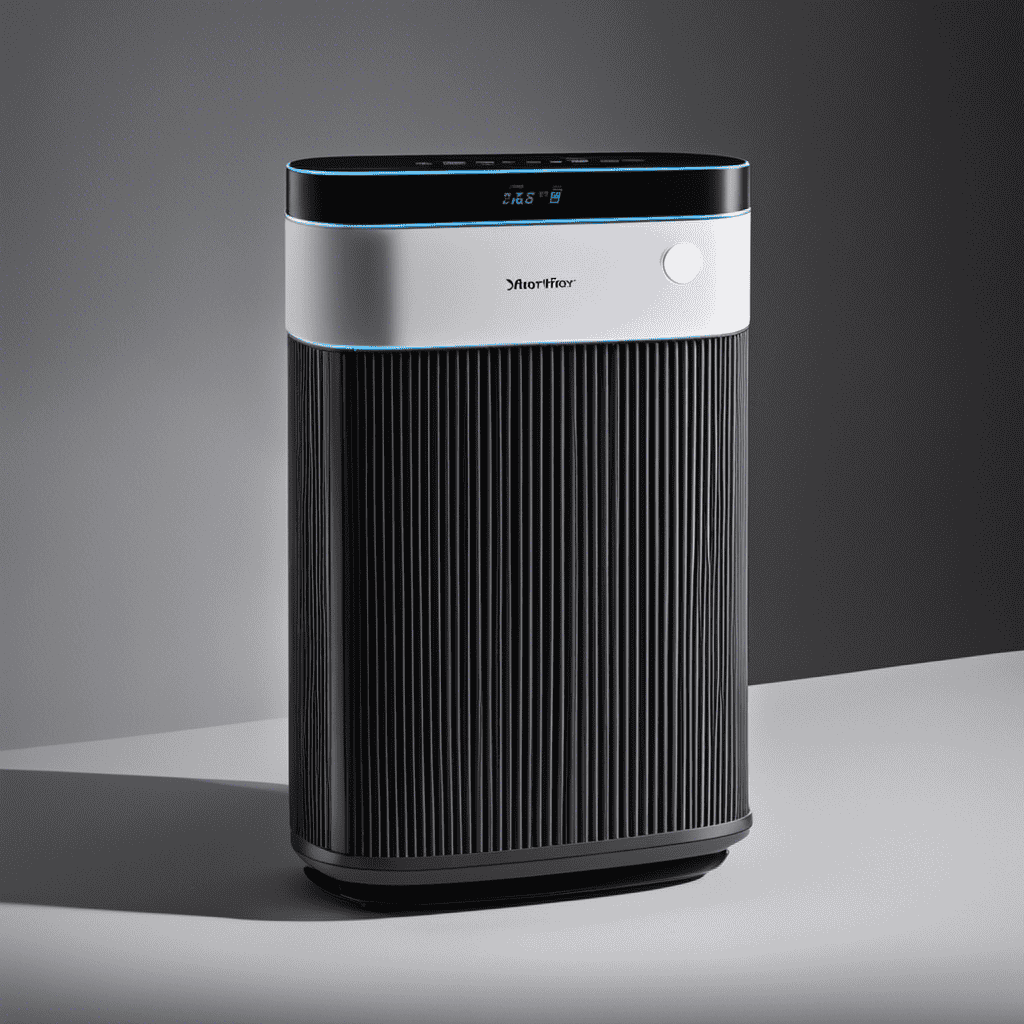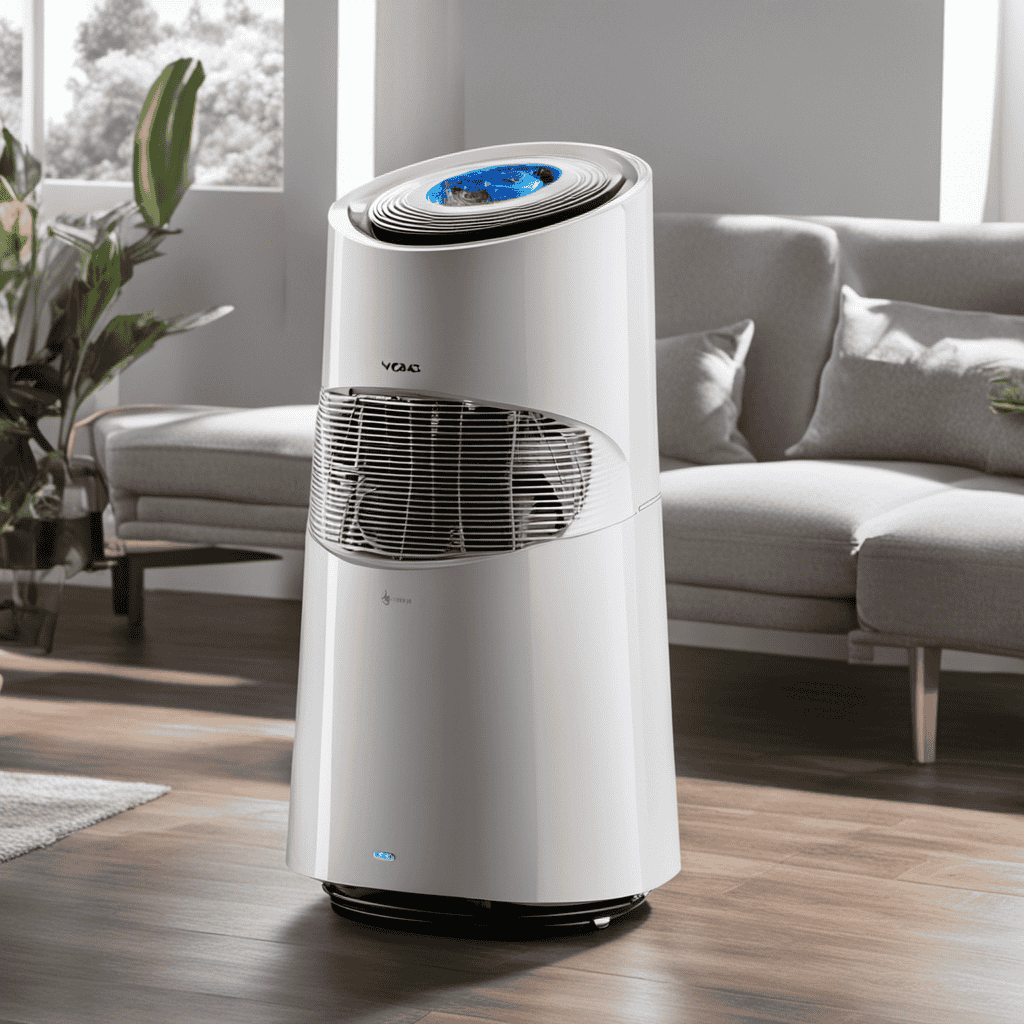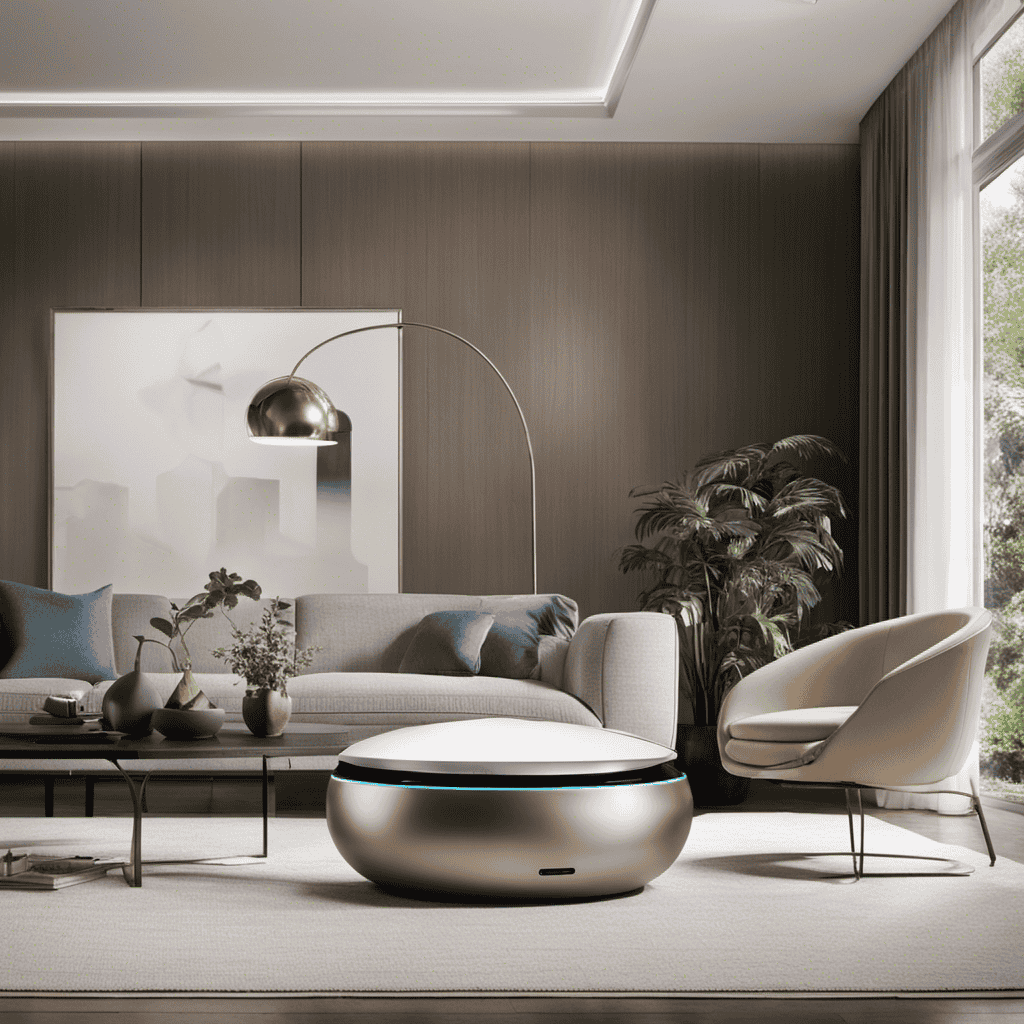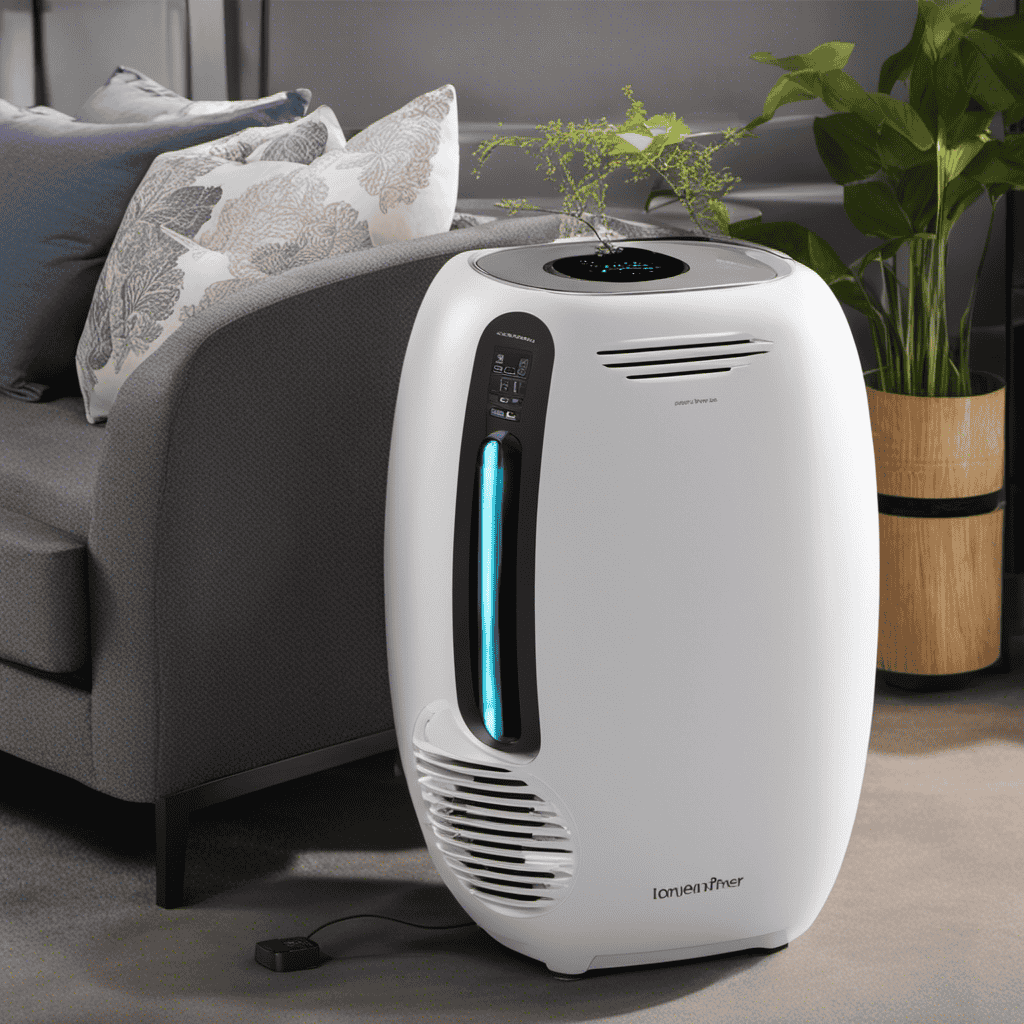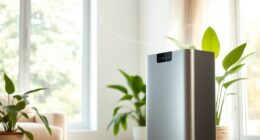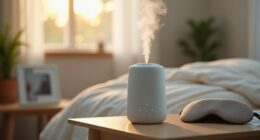I’ve always been intrigued by the mechanics of how things operate and their potential to enhance our life quality.
One such device that has caught my attention lately is the air purifier ionizer. It’s like having your very own air superhero, silently fighting against invisible enemies like dust, pollen, and pet dander.
But what exactly is an air purifier ionizer, you might ask?
In this article, we’ll delve deep into the world of air purification, exploring how these devices work, their benefits, different types available, and much more.
So sit back, relax, and get ready to breathe in the fresh, clean air.
Key Takeaways
- Air purifier ionizers release negative ions into the air to improve indoor air quality by removing pollutants and allergens.
- These negative ions attach to positively charged particles in the air, making them heavier and causing them to fall or stick to surfaces.
- Air purifier ionizers can remove particles as small as 0.01 microns, effectively reducing allergens and improving air quality.
- While air purifier ionizers can eliminate odors and neutralize bacteria and viruses, there are potential risks associated with prolonged exposure to high levels of negative ions and increased ozone emission.
How Does an Air Purifier Ionizer Work
To understand how an air purifier ionizer works, you need to know that it releases negative ions into the air.
Air purifier ionizer technology is designed to improve indoor air quality by removing pollutants and allergens from the air.
When the ionizer is turned on, it emits negatively charged ions that attach to positively charged particles in the air, such as dust, pollen, and pet dander.
This process causes the particles to become heavier and fall to the ground or stick to surfaces, effectively removing them from the air.
Compared to other air purifying methods, like filters or UV light, ionizers have the advantage of being able to remove particles as small as 0.01 microns.
However, it’s important to note that ionizers can produce ozone as a byproduct, which may be a concern for individuals with respiratory conditions.
Benefits of Using an Air Purifier Ionizer
Using an air purifier ionizer can help improve indoor air quality and reduce allergens. An air purifier ionizer works by releasing negatively charged ions into the air, which attach to positively charged particles like dust, pollen, and pet dander. This causes the particles to become heavy and fall to the ground or adhere to surfaces, effectively removing them from the air.
Compared to air purifier filters, ionizers do not require regular replacement, making them more cost-effective in the long run. Additionally, air purifier ionizers can eliminate odors and disinfect the air by neutralizing bacteria and viruses.
However, it is important to note that ionizers also produce ozone as a byproduct, which can be harmful in high concentrations. Therefore, it is crucial to choose an ionizer with low ozone emissions and use it in a well-ventilated space to ensure safety and effectiveness.
Different Types of Air Purifier Ionizers
When choosing an air purifier, it’s important to consider the different types of ionizers available. Ionizer technology plays a crucial role in improving indoor air quality by removing pollutants and allergens from the air.
There are two main types of air purifier ionizers: electrostatic precipitators and negative ion generators. Electrostatic precipitators work by charging particles in the air and collecting them on oppositely charged plates. This process effectively removes larger particles such as dust and pollen.
On the other hand, negative ion generators release negatively charged ions into the air, which attach to airborne particles and cause them to settle. This method is effective in removing smaller particles like smoke and pet dander.
Understanding the different types of air purifier ionizers is essential in selecting the most suitable device for your specific needs.
Factors to Consider When Choosing an Air Purifier Ionizer
When choosing an air purifier ionizer, it’s important to consider key features such as the type of ionizer technology used, the presence of additional purification technologies, and the coverage area it can effectively purify.
Room size compatibility is crucial to ensure that the ionizer can adequately clean the air in the desired space. Additionally, maintenance and filter replacement should be taken into account to ensure the longevity and efficiency of the ionizer.
Key Ionizer Features
To understand the key features of an air purifier ionizer, you’ll want to take a closer look at how it effectively removes pollutants from the air.
One of the key benefits of an ionizer is its ability to eliminate airborne particles such as dust, pollen, and pet dander. This is achieved through the use of ionizer technology advancements, which release negatively charged ions into the air.
These ions attach themselves to positively charged particles, causing them to become heavy and fall to the ground or stick to surfaces, effectively removing them from the air you breathe.
Additionally, ionizers can help neutralize odors and remove harmful gases, making the air in your home cleaner and fresher.
With these key features in mind, let’s now explore the compatibility of air purifier ionizers with different room sizes.
Room Size Compatibility
If you have a smaller room, you’ll want to consider the compatibility of the ionizer with its size. Room size compatibility is an important factor to consider when choosing an air purifier ionizer. The effectiveness of an ionizer depends on its ability to circulate and purify the air in a given space.
A smaller ionizer may not be able to adequately clean the air in a larger room, while a larger ionizer may be unnecessary and consume more energy in a smaller room. It is important to match the size of the ionizer to the size of the room for optimal performance and energy efficiency. By ensuring room size compatibility, you can maximize the benefits of the ionizer while minimizing energy consumption.
When it comes to air purifier ionizers, maintenance and filters play a crucial role in ensuring their effectiveness.
Maintenance and Filters
Now that we have discussed the compatibility of air purifier ionizers with different room sizes, let’s move on to the maintenance and filters associated with these devices.
One important aspect to consider is the lifespan of an air purifier ionizer. On average, these units can last anywhere from 5 to 10 years, depending on the quality and brand. However, regular maintenance is necessary to ensure optimal performance.
This includes cleaning the filters regularly, as they can become clogged with dust and other particles over time. Speaking of filters, it’s important to factor in the cost of replacing them. The price of air purifier filters can vary depending on the brand and model, ranging from $20 to $100 or more.
It’s essential to factor in this cost when considering the overall investment of owning an air purifier ionizer.
Common Misconceptions About Air Purifier Ionizers
When it comes to air purifier ionizers, there are several key points that need to be discussed.
Firstly, the health benefits of these devices have been questioned by experts in the field.
Secondly, there are concerns about the potential risks of ozone emissions from air purifier ionizers.
Lastly, it is important to evaluate the effectiveness of these devices in removing pollutants from the air.
These three aspects will be explored in detail to provide a comprehensive understanding of common misconceptions surrounding air purifier ionizers.
Health Benefits Questioned
The health benefits of air purifier ionizers have been questioned. While these devices claim to improve indoor air quality by releasing negatively charged ions, there is limited scientific evidence to support their effectiveness. Here are some key points to consider:
-
Air purifier ionizer vs. traditional air purifier:
-
Air purifier ionizers release negative ions into the air, which attach to airborne particles and cause them to settle.
-
Traditional air purifiers use filters to trap and remove particles from the air.
-
Long term effects of using an air purifier ionizer:
-
Some studies suggest that prolonged exposure to high levels of negative ions may have harmful effects on respiratory health.
-
There is a lack of research on the long-term effects of using air purifier ionizers, making it difficult to assess their safety.
It is important to consult scientific literature and experts before making a decision about using air purifier ionizers for your health.
Ozone Emission Risks
Using air purifier ionizers may lead to increased emission of ozone, which can pose risks to respiratory health. Ozone is a highly reactive gas that can irritate the respiratory system when inhaled. It can cause shortness of breath, coughing, and chest pain, particularly in individuals with pre-existing respiratory conditions such as asthma or chronic obstructive pulmonary disease (COPD).
Ozone emission regulations have been put in place to limit the amount of ozone produced by air purifier ionizers. These regulations aim to protect public health by ensuring that ozone emissions remain within safe limits. It is important for consumers to be aware of these potential health hazards and to choose air purifiers that comply with ozone emission regulations to minimize the risk to respiratory health.
Effectiveness in Removing Pollutants
You should consider the effectiveness of removing pollutants when choosing an air purifier. The impact of indoor air quality on our health cannot be underestimated. An air purifier that effectively reduces allergens and pollutants can significantly improve the air we breathe.
Here are some key points to help you understand the effectiveness of air purifiers:
-
Benefits of an effective air purifier:
-
Reduces allergies: An air purifier with a HEPA filter can trap allergens like pollen, dust mites, and pet dander, reducing allergy symptoms.
-
Improves indoor air quality: By removing pollutants such as smoke, odors, and volatile organic compounds (VOCs), an air purifier can create a healthier living environment.
-
Factors influencing effectiveness:
-
Filtration system: Look for air purifiers with HEPA filters, as they are highly effective in capturing small particles.
-
Air exchange rate: Consider the air purifier’s ability to clean the air multiple times per hour, ensuring continuous purification.
Tips for Maintaining and Cleaning an Air Purifier Ionizer
To keep your air purifier ionizer running efficiently, it’s important to regularly clean and maintain it. Proper maintenance ensures optimal performance and prolongs the lifespan of the device.
One common issue that may arise is air purifier ionizer troubleshooting. If you notice a decrease in air quality or weak airflow, check for clogged filters or a dirty ionizing unit. Cleaning the filters regularly, according to the manufacturer’s instructions, is crucial in preventing dust and debris buildup.
Additionally, the importance of proper placement should not be overlooked. Ensure that the air purifier ionizer is positioned in an open area, away from obstructions, to allow for maximum air circulation. Avoid placing it near curtains, furniture, or walls to prevent airflow restriction.
Frequently Asked Questions
Can an Air Purifier Ionizer Completely Eliminate All Pollutants From the Air?
No, an air purifier ionizer cannot completely eliminate all pollutants from the air. While it can help improve air quality, it may be harmful to pets and its impact on sleep quality varies.
Are Air Purifier Ionizers Safe to Use for People With Respiratory Conditions?
Air purifier ionizers can be safe for people with respiratory conditions. They release negatively charged ions that attach to pollutants, causing them to fall to the ground. However, it’s important to consider individual sensitivities and consult a healthcare professional.
Can an Air Purifier Ionizer Remove Unpleasant Odors From the Air?
Yes, an air purifier ionizer can remove unpleasant odors from the air. It uses negative ions to neutralize and eliminate odorous particles. Regular maintenance, such as cleaning the filters, ensures optimal performance and benefits.
Do Air Purifier Ionizers Produce Any Harmful Byproducts?
Yes, air purifier ionizers can produce harmful byproducts such as ozone, which can pose potential health risks and have negative environmental impacts. It’s important to consider these factors when using an air purifier ionizer.
Are Air Purifier Ionizers Effective in Large Open Spaces or Only in Smaller Rooms?
Air purifier ionizers are effective in large open spaces, not just smaller rooms. They can help improve air quality by removing pollutants and allergens, making them beneficial for commercial spaces like offices.
Is an Ionizer Option Air Purifier the Same as an Air Purifier Ionizer?
Yes, an ionizer option air purifier is the same as an air purifier ionizer. Both types of air purifiers feature ionizer technology, which helps to remove airborne particles and improve air quality. Whether it’s referred to as an ionizer option air purifier or an air purifier ionizer, the function remains the same.
Conclusion
In conclusion, an air purifier ionizer is a valuable tool in improving indoor air quality. By using ionization technology, these devices remove harmful particles from the air, such as dust, allergens, and bacteria.
The benefits of using an air purifier ionizer include reducing respiratory issues, eliminating odors, and creating a healthier living environment.
There are different types of ionizers available, so it’s important to consider factors such as room size and specific needs when choosing one.
It’s crucial to maintain and clean the device regularly to ensure optimal performance.
Overall, air purifier ionizers are an effective solution for cleaner and fresher air indoors.
